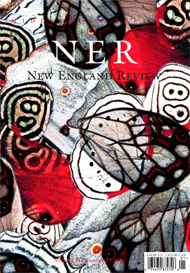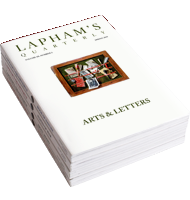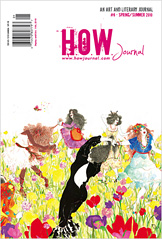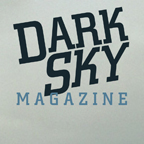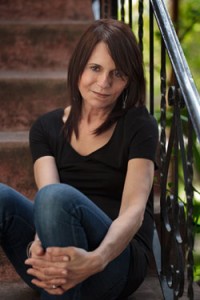 Thaisa Frank’s short stories have received two PEN awards, and her two most recent collections Sleeping in Velvet, 1998, and A Brief History of Camouflage, 1992, have been on the Bestseller List of the San Francisco Chronicle. Frank returns with her first novel titled Heidegger’s Glasses. Set in the final days of World War II, the novel explores an underground compound of scribes hidden deep in the German forest who must answer letters written to those killed in the camps.
Thaisa Frank’s short stories have received two PEN awards, and her two most recent collections Sleeping in Velvet, 1998, and A Brief History of Camouflage, 1992, have been on the Bestseller List of the San Francisco Chronicle. Frank returns with her first novel titled Heidegger’s Glasses. Set in the final days of World War II, the novel explores an underground compound of scribes hidden deep in the German forest who must answer letters written to those killed in the camps.
Q (Meg Pokrass): As a reader, which writers do you feel closest to?
I feel closest to Kafka, although I have been influenced by Faulkner, Donald Barthleme, I.B. Singer, Flannery O’Connor, Sigrid Undest, Par Lagerqvist, Richard Brautigan, Ana Hatherly, Borges, Gogol and Flaubert. Without question there are numerous writers that I haven’t mentioned. Recently I really enjoyed Tom McCarthy’s book, Remainder (published in the Paris underground after it was rejected by everyone in Britain, picked up when it became it had a cult following in Paris, and eventually was published in this country.) I’ve also liked Jane Mendelsohn (I was Amelia Earhardt) and Mark Haddon’s The Curious Incident of the Dog in the Nighttime. Perhaps Kafka influenced me the most because he works in a surrealist mode and wrote the first fairy tales of modern life. If you’re curious about the difference between surrealism, magic realism, and fantasy, I wrote a column for The Divining Wand.
At different points, have you had mentors?
My mentors have been the writers I’ve read, which is how I think most writers learn. So all of the writers listed above–and numerous short story writers and flash fiction writers. At times I’ve had good editors. I think they were less mentors than voices from the open marketplace that told me what I had to do to get a book published. (It’s amazing how writers will change things for editors.)
Do you mentor?
I guess I do. In fact I’m in the curious position of teaching writing without ever having taken a workshop. I majored in philosophy of science, which–oddly-became useful when thinking about how to teach fiction writing which I think (and I know many people would agree with me) is essentially unteachable. I tend to look at the balance of a story first, just the way a carpenter would look at a table. I try to look at things that don’t necessarily have meaning in a story–things that fracture unity and pieces of the story that have valence. I’ve devised my own methods of thinking about fiction and voice. (I co-authored Finding Your Writer’s Voice, which is still in print and is part of St. Martin’s Writers Library.) When a writer is flailing about (as we all do), I encourage them to work with voice–who they are and how they express that artistically. It’s usually voice that makes readers willing to follow a writer.
Even though I don’t think fiction writing can be taught, I do think that a story–once it’s whole–can be edited. But that can’t happen until a writers plunges into improvisation and is surprised by their own story. Unless a story is a discovery for the writer (rather than a recording of what they’ve decided to write), it won’t be a discovery for the reader. I try to help writers make that discovery.
How do you stay creative?
In truth, I’ve never known how to do this. It’s either happening for me or it’s not. And I’m a sprinter, not a marathon runner. That is, I can go for days without writing and then work nearly around the clock. I tend to work by generating a lot of fragments, half-baked stories, and phrases. So I always have something I can do. But there are times when I spin my wheels and feel totally worthless. I tend to work quickly when I work, as though I’m entering a different time zone–or maybe a place where time disappears. I hope that makes up for the taffy-like sense of time I often experience when I’m not writing.
What are your tricks to get “unstuck?”
I have a bunch of exercises that other people have found helpful, but there’s only one that ever helped me, which is writing grammatical nonsense. The words can’t link together in any associative way, even though you may make sense of them later. For e.g. Spoons calibrate talkative leaves. This exercise seems to give the inner critic/editor an entirely different job from the usual job, which is making sure that things make sense. And when you go back to writing sense, the inner critic relaxes, just like a backseat driver you’ve given the wheel. It’s hard to write nonsense but it’s not a big deal to fail at it. And you can cheat by taking words from different realms (chemistry, literary criticism, politics, jive, cooking) and mixing them up, It’s very hard at first, but after a while you get good at it.
I don’t have any other tricks that help me get unstuck, but there’s one thing I try to avoid, which is the kind of “journaling” (when did that get to be a verb?) that’s going to tell me what I already know about my day, rather than a writer’s log where I discover what I don’t know. This kind of writing just encourages linear thinking, which isn’t what writing is about. (Again, I know a number of people who will disagree with me.)
What is happening right now that you would like to share in your writing world?
My book has been picked up by a lot of foreign publishers before publication and I met a few of them today at the BEA. Europe really seems to like this book–and it makes me happy to know it will travel across the ocean. And of the foreign publishers have been very interested in the part of the book that touches on Heidegger–that is, the intellectual overlay that isn’t necessary to catch in order to b e interested in the plot. My Italian publisher, Neri Pozza, was in philosophy and they publish Europe’s leading expert about Heidegger. So they were very excited and I was excited, too, even though the irony of Heidegger’s philosophy–what he’s saying about the nature of reality (and the paradox of his being a member of the Party)–is lost on most readers.
How does your background as a psychotherapist influence your writing if it does?
Actually, it had a negative influence for the following reasons: (1) Psychology is aimed at reducing the mystery of human life and fiction is aimed at elevating it. There’s a reductionistic flavor to the best of psychology that is a bane to the fiction writer who has to see characters whole and full-blown, like found works of art.. (2) Also, as a therapist, I was sworn to secrecy because of the confidentiality issue. So I had to put the fiction-writer’s part of my brain on hold. It was like being in a large dysfunctional family where everyone had a secret I wasn’t supposed to tell and I couldn’t use my imagination during sessions. (3) I also couldn’t ask questions that fiction writers ask out of curiosity. For example, if a client said that he and his girlfriend went out to dinner and had a fight I wanted to know: What was the restaurant? What did you have to eat? In other words, I wanted information that would place it in a scene. But therapists can’t ask those questions. (Sometimes I cheated and did ask.) (4) Therapists can only talk when appropriate, and can only “share” their lives when appropriate. Most of the time it’s about silence and active listening. Writers tend to be active listeners, which is why many people do tell them stories. But in my experience writers like to tell stories, too. So that vow of silence was grueling. (5) Many therapists think that art is some kind of insane expression of the unconscious. Or they want to be artists. Or both. I often felt I was in a strange community. (I hope this won’t discourage any writer from getting a degree in therapy: ) )
How did you come up with the idea for your soon to be released novel Heidegger’s Glasses?
Years ago, when I’d just written a couple of books of short fiction, I had an image of a woman in a mine, answering letters to the dead. I wrote about sixteen pages and knew that the situation was too complex for a short story. But I never considered myself a novelist. So I put it away. A few years ago I was at a party and someone told me that Heidegger had a revelation about his own eyeglasses. (He looked at them and forgot what they were for, as though he were from the cave days or a different planet and got sort of stoned on the notion that we try to hold our human world together by fragile sense of meaning.) I had completely forgotten about the sixteen pages. But when I heard this story, I thought: “Wow. Heidegger’s Glasses would be a great title.” So I began to write a story about WWII, completely forgetting about the mine. But when I got the proofs for the book, those first sixteen pages popped out of a drawer, and I realized they were the DNA for the book I actually wrote. The title is what catalyzed the book. But obviously I’d been mulling it over for a long time.
You have told me that you adore flash fiction – both writing and reading it. Can you talk about why you are specifically drawn to this/fond of this form?
I like flash fiction (short but with characters) and prose poems (also short but with a transforming image instead of characters) because they’re short enough so that the voice of the line can coincide easily with the voice of the story, which is always bigger than the sum of its parts. You can see how the piece is working as a whole without hours of slaving away at a novel or a longer short story. And if you can get a piece of flash fiction to feel “whole,” to have unity, chances are you’ve begun to discover your unique vision of the world. There’s a throw-away quality to this kind of writing, like a found dream. Some of my prose poems and flash fiction pieces have worked right away and others have taken years to develop. I also like it because it’s the one kind of fiction I’ve found I can teach in a workshop. So I take back my statement that fiction is unteachable. I actually think that anyone can learn to write a good piece of flash fiction.
The Fictionaut Five is our ongoing series of interviews with Fictionaut authors. Every Wednesday, Meg Pokrass asks a writer five (or more) questions. Meg is an editor at Smokelong Quarterly, and her stories and poems have been published widely. She blogs at http://megpokrass.com.
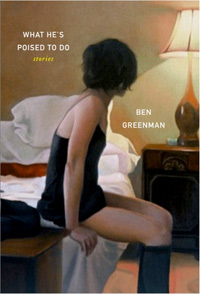
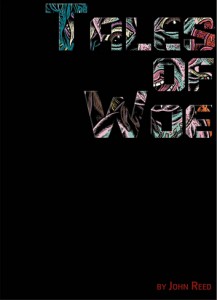
 Thaisa Frank
Thaisa Frank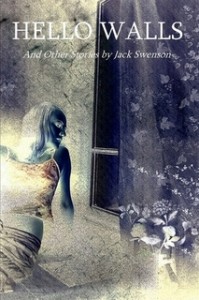 Jack Swenson
Jack Swenson